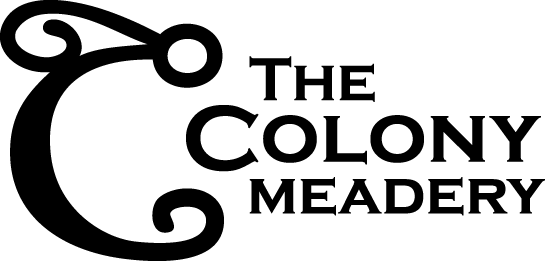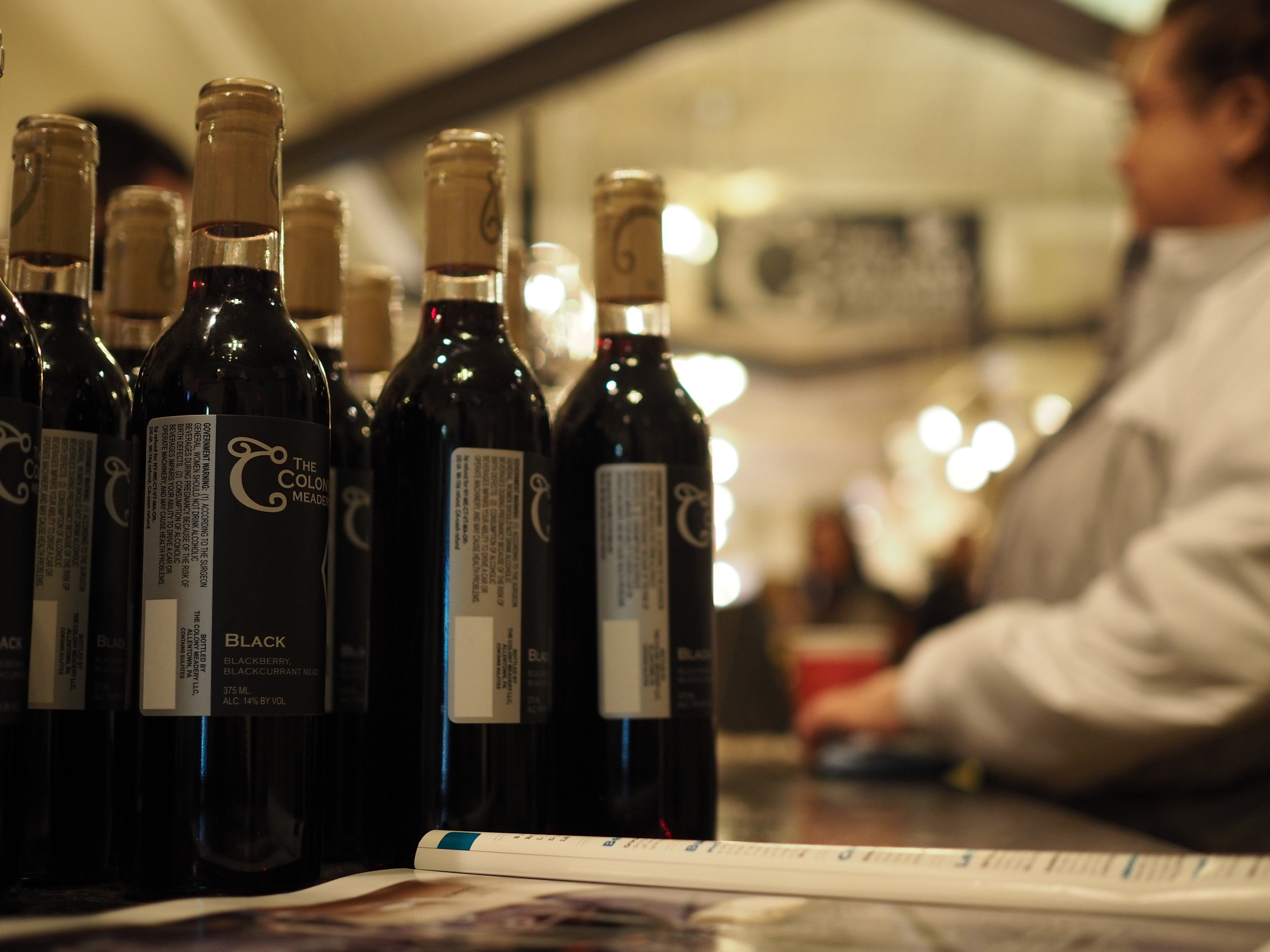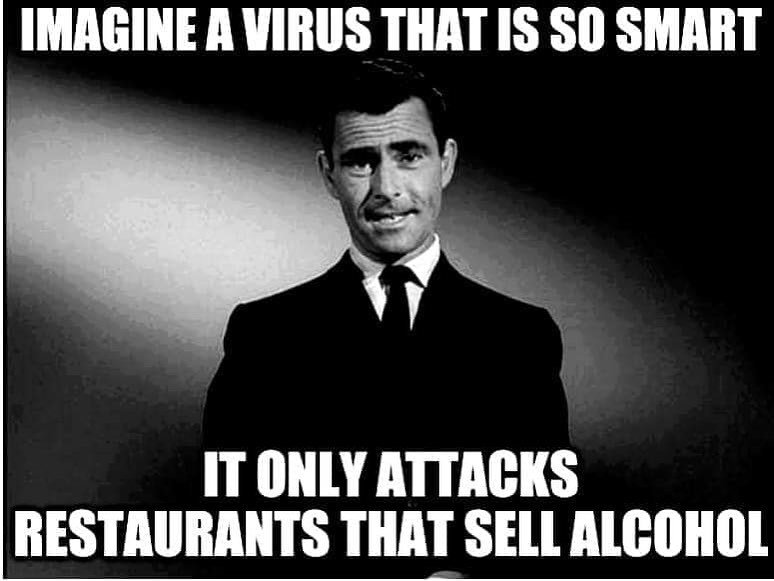Yesterday, in a press conference at around 3 pm, Pennsylvania Governor Tom Wolf announced new rules in response to rising rates of COVID-19, after a few weeks of improvement in the Commonwealth. His new rules were mostly focused on bars and restaurants (which includes PA breweries, wineries and distilleries). It banned ALL on-premise consumption of alcohol… unless it was accompanied by a meal. The rule went into effect at 12:01am this morning. Always trying to find some humor in dark times, we put up a Facebook post joking that, apparently, eating food protects you from COVID and expressing our frustration at the rule’s implementation. About one-third of people who responded joined us in an expression of “that sucks; sorry to hear it”; another third decided this was a call to action against the Governor, masks, laws and other things; the final third expressed disappointment in us for being selfish, blaming the governor for his rule instead of people who didn’t wear masks, not taking the virus seriously, and missing our chance to be a “community leader.”
If the shutdown should have taught us anything by now, it’s that 1. some will ruin a nice thing for all of us and 2. don’t read the comments. We’re dumb, because it apparently we didn’t learn.
A few things to clarify first, before getting into the real issues with the ruling:
Masks help stop Coronavirus spread. Wear them. Don’t be a jerk.
If you define being a “community leader” (in quotes because it was an odd phrase that several people used) as accepting every government action, or agreeing with one person, all the time, we were probably never going to fit that description. In fact, we spend a lot of time and energy trying to get rules we find unfair changed for the betterment of many communities of which we consider ourselves a part. It’s fine to disagree with us, but please don’t confuse that with a lack of character on our part, and we won’t on yours.
Of course governors everywhere have an impossible job right now trying to balance competing imperatives, and of course their primary duty is to protect citizens. But that doesn’t mean that they are immune to criticism when they do something wrong. So the idea that Wolf isn’t responsible for the shortcomings of the decisions he makes unilaterally is frankly ridiculous. Again, disagreement is good.
We absolutely agree that something needed to be done to protect people; we just don’t think this will do that, and it will cause real economic harm in the process of not helping.
On that note, let’s dig into the main issues with this rule, from the perspective of those of us who have to live it, every day:
Stolen from our friends at the Mint Gastropub: https://www.bethlehemmint.com/
The Timing.
The rule was announced at his press conference, around 2pm. In it, he seemed to indicate outdoor seating would be unaffected. Then the press release came out around 3pm, which indicated that it was subject to the same meal restriction. The rule took effect at midnight, less than 8 hours later. As of this writing (around noon on Thursday) we still have no guidance from the state as to what constitutes a “meal”.
This comes on the heels of two weeks in “green” and about a month in “yellow.” Every time we get set up for a state of operations (which involves things like new procedures, new seating arrangements, and new equipment to keep everyone safe), the rules change, with no warning at all. This is absurd, and does not need to be this way. If the governor’s office were considering this rule all week, giving us a heads up on Monday would have helped us prepare (for example, we have tours booked for this weekend). So, either: The governor’s office was thinking about this and was deliberately not transparent with its licensees, or this was a decision as rushed as it appears to be, and I’m not sure which is worse.
The Capriciousness
This rule seems to boil down to: a person can sit in a seat at a table at an establishment. If they order a drink but do not know what food they would like yet, they can not have it. If they would like a drink but not food, they can not have it. If they order a meal and a drink, it is okay. There is, so far as anyone can tell, no justification for this on any level. Eating, like drinking, requires the removal of a mask. Either way, the person is seated at a table. Either way, the person is drinking. The only difference is the presence of food. This is what leads everyone to make memes about how COVID-19 apparently hates chicken fingers. It’s not grounded in any science, and so there’s no reason to believe this will help protect anyone.
Some on Facebook made the argument that alcohol lowers inhibitions, and so people looking to get drunk would be less careful than those looking to eat a meal. Let’s set aside the rather cringe-inducing stereotyping embedded in that assumption, and examine it on its face. Either way, you have to sit at a table. Either way, social distancing and mask rules are still in effect. Either way, maximum party size rules were already in effect. The presence of a sandwich changes nothing.
Ok, now to hammer the pretty ugly stuff under that assumption. It’s one thing to assume you’re a better person than someone else because of your behaviors and choices (it’s uncharitable, but at some level we all do it). It’s totally another to assume you’re better because you can afford to eat out with your discretionary income whereas someone else can only afford to have a couple drinks, or that someone else finds it healthier or more compliant with their diet or religion to eat in and drink out. There’s nothing morally superior or more socially conscious about your burger and glass of wine than someone else’s IPA and popcorn.
Lastly: I’ve seen a few local places that are definitely not adhering to the rules. I’m not going to call anyone out, but they’re the same ones everyone has seen playing fast and loose with the rules. You know what they all have in common? KITCHENS. This rule stops us, not them. Which leads me to…
The Toothlessness
We already had a lot of rules. Like most responsible business owners, we were abiding by them, and we were doing it in spite of the fact that we knew there was basically zero enforcement. Not everyone was so conscientious, and the ones who ignored the rules did so mostly to their benefit. The LCE (liquor cops) released their report for July 6-12, and it shows 77 warnings and zero violations given in 4,360 visits statewide. To some extent, I don’t blame the LCE. Everyone is winging it, and all of us were put in charge of policing someone else’s rules at our own establishments, so there’s a case for leniency.
But, maybe, before enacting more rules that don’t promise to do much, we could try enforcing the ones we had? Because as far as I can tell, this will only impact the people who were already doing their best to keep everyone safe. The bars that ignored this before can still do it (again, they all sell food). Wolf is effectively demanding more of the responsible businesses because he finds it too hard to punish the unreasonable ones.
In case you thought July 4 weekend was more enforced.
The point of all this isn’t to complain; we know, lots of people are going through hard things, and our ability to sell mead is appropriately low on your priority list. But to the folks who dismissed this as being “inconvenient” on our feed: It’s way more than that. Decisions like this very much hold in the balance the ability of businesses like ours to exist, pay debts, and employ people. That matters a great deal to many people, and much more so when you multiply it out by all of the companies subject to this rule. Not to mention that, when a leader makes decisions that appear poorly-conceived, -planned and -executed, it raises questions about everything they do subsequently. But, even if you don’t care about the principles of fairness, effectiveness and transparency from governance, we hope you can at least care about the people whose families are affected.
So, what would we have done? Personally, I think almost every brewery/bar owner I talked to was fine going back to yellow rules, with outdoor seating only. Everyone understood them, and it was those procedures that kept the numbers moving in the right direction. Plus, it lines up with the research we have, that outdoor spaces are MUCH safer than even controlled indoor ones.
Instead, we appear to have preserved the far more dangerous indoor dining - albeit at a level that no establishment I know of can support, at 25% capacity including staff - put the hurt on responsible businesses who had just invested in outdoor spaces, and managed to do it all in a slipshod way that exacerbated partisan divides and undermined confidence in decision makers.
Once again, if you disagree with our assessment, we fully respect that. We understand that there’s a lot of not-very-clear information out there, and what we do know can lead smart, well-meaning people to disagree. We thank you for taking the time to read our views on things and consider them, and we hope to see you back in the tasting rooms soon.










